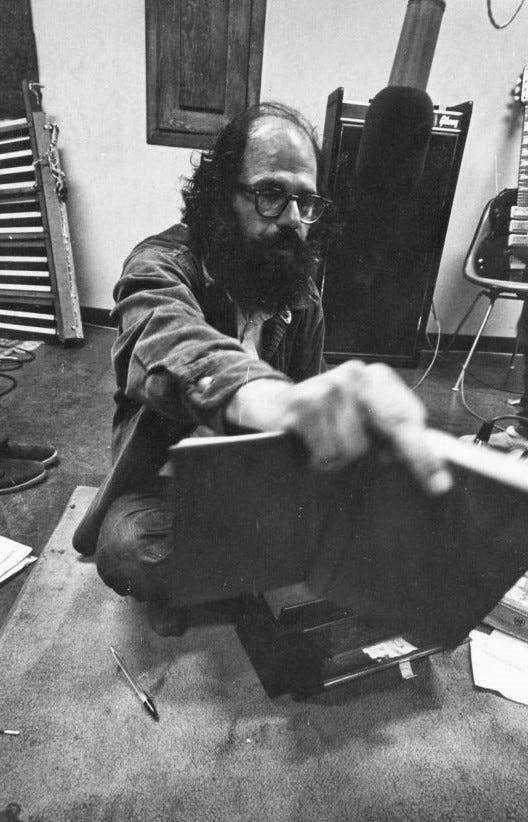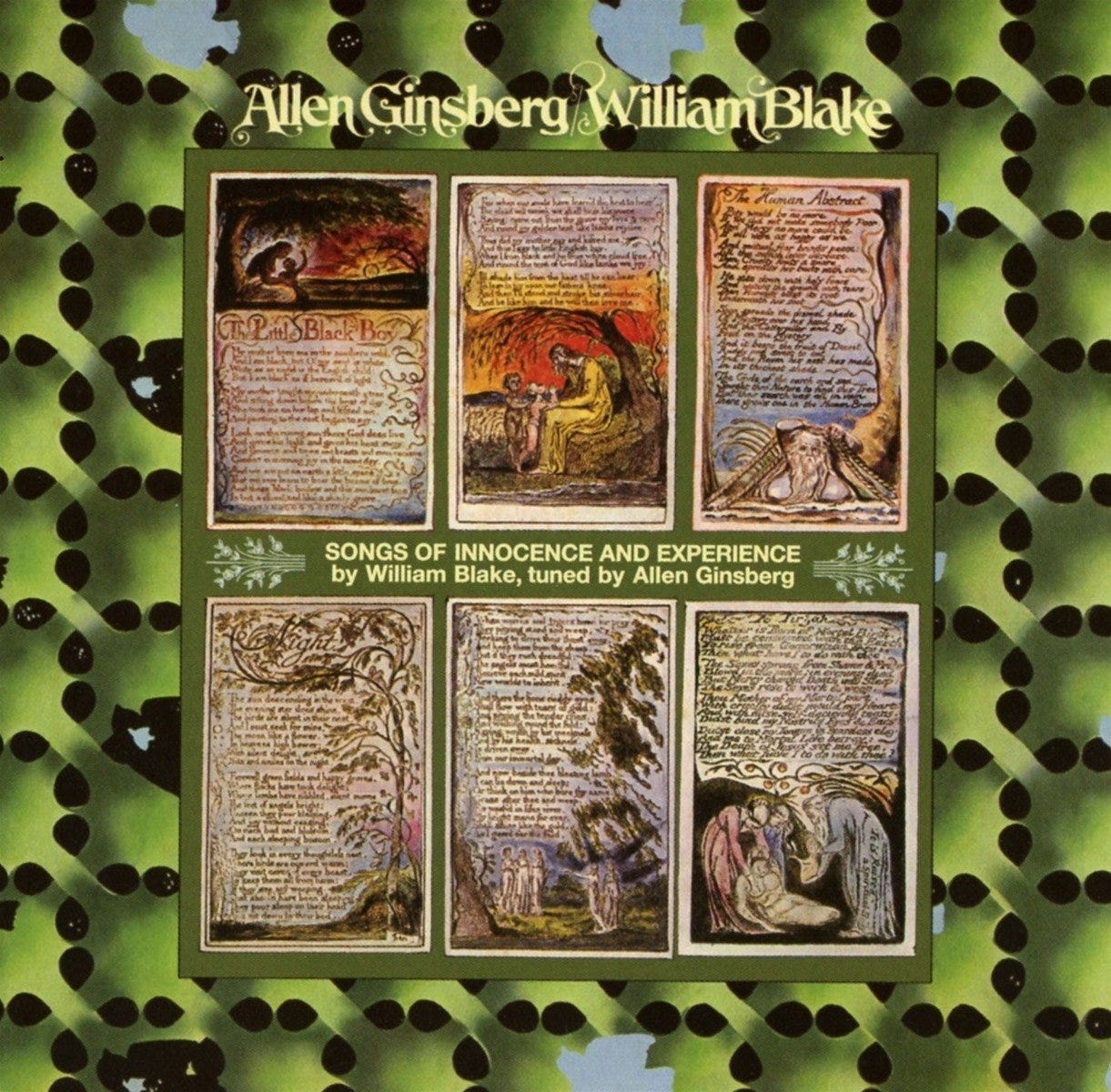With the Beatniks: Ginsberg's and Burroughs's Spoken Word Albums
I
Allen Ginsberg, The Complete Songs of Innocence and Experience
Songs of Innocence and Experience is the seminal work of William Blake (1757-1827), perhaps the most respected and referenced English Romantic poet. An essential book for any library, it is a collection of dark, pastoral poetry that deals the corruption of growing up, the then-burgeoning cities, and their already sick societies infested with poverty and other significant ills.
Between 1968 and 1970, the book was set to music by another visionary: Allen Ginsberg, a Beat poet and key figure of the counterculture. Inspired by the fear and disgust from the violence at the Democratic National Convention in Chicago—though he had been having visions since the 1940s thanks to Blake's poetry—he joined avant-garde musicians Peter Orlovsky, Bob Dorough, Don Cherry, and Elvis Jones to set Songs of Innocence and Experience to music, in sessions released in 1970 on an LP distributed by MGM and Verve.
A year later, Ginsberg gathered eleven new versions of Blake's poems with musician Arthur Russell and a Buddhist choir, although many recordings from the 1971 sessions were not edited until 2017.
That year, Omnivore Recordings, a label known for its careful reissues and anthologies of rare material from key figures of 20th-century pop (from Big Star to Art Pepper), re-released these tracks in a special two-disc edition. The raw and emotional voice of Allen Ginsberg serves as a great excuse to return to a renewed William Blake, filtered through one of his heirs, a poet who transcended the Beat label and captured an era, propelling art into its next evolutionary step.
The Complete Songs of Innocence and Experience is a historically significant document featuring nearly two hours of recordings. Artistically, it represents a union of eras that, when combined, result in a sound that is both idyllic and chimerical; historically, it showcases the important legacies of both William Blake and Allen Ginsberg, two total authors.
Musically, we can enjoy an obscure LP that, having sold out its original pressing decades ago, stands as a convergence point of the most idiosyncratic jazz, the most pastoral folk, countercultural psychedelia, and political spoken word—a mix that also provides an accurate snapshot of the end of the wild 1960s.
Records like this chart new paths in a pop historiography that has yet to be fully explored and understood, proposing alternative directions to expand a musical universe that continues to seek identity and solidity today; that is, alive and vital. Classics will always be modern. Blake and Ginsberg are just one more example.
II
William Burroughs, Let Me Hang You
“Cunts, pricks, fence strafflers, tonight I give you—that internationally known impresario of blue movies and short-wave TV, the one, the only, The Great Slashtubitch!”
Thus begins the chapter "A.J.'s Annual Party," the central part of the most obscene, brutal, weevil-infested, excremental, and disruptive classic of modern literature, The Naked Lunch by William Seward Burroughs II. A complex book, a latrine filled with droppings, viscous sap, and spoiled, infectious secretions; a wall covered in scratched words amid scabs of sludge, pieces of crushed beetle, and putrid golden larvae; a majestic, surrealist, drug-fueled ramble that was published in 1959 by Olympia Press in Paris and a few years later by Grove Press in the United States, where it did not pass the censorship of the obscenity laws in effect at the time.
The book—which cannot confidently be called a novel—is a collection of seemingly disconnected texts, structured around the cut-up technique of non-linearity, dealing with drugs, pornography, depravity, totalitarian governments, hard narcotics, and religion. It is undoubtedly a landmark reference for literature, music, film, and art at the turn of the millennium.
Let Me Hang You (the title referring to A.J.'s libertine party) is a series of recordings made by William S. Burroughs, criminal and author, in the years leading up to his death in 1997 from a heart attack; these are readings of his favorite passages from The Naked Lunch, presumably the coarsest.
The sessions were produced by Hal Willner and, although they were released as a condensed audiobook by Warner Bros., the pressing was extremely limited and the project was soon forgotten and shelved. These recordings featured musical accompaniment from Bill Frisell and Wayne Horvitz of Naked City, John Zorn's group.
Clearly, the story didn't end there. These tapes, which languished neglected “as forgotten as a piece of rancid ectoplasm on a peepshow floor,” according to the promotional text for the album, were dusted off by Willner. Enter King Khan, the wild Canadian responsible for some of the most feral records and concerts of the new century, who was tasked with re-scoring Burroughs's readings. He accepted the challenge and devised a plan.
He recruited M Lamar, the provocative leader of the Negrogothic movement that combines opera, spirituals, blues, metal, sadomasochism, horror, and punk to assist him. And as if that weren't enough, he added another corrosive substance: The Frowning Clouds, the Australian garage band, whose surreal imagery of neopaganism and hallucinogenic drugs, along with their nugget-like sound, further bombarded the pulsating mugwump head that the project ultimately became, released by Khannibalism, King Khan's label.
The result would have pleased Burroughs, as it has done for hordes of his followers who exhausted two pressings of 500 copies of the vinyl record. The recordings sound formidable. The music creates an atmosphere that fits the adjective "Burroughsian," and the writer gifts us horror, duplicity, and malice in every syllable. For a spoken word album, it is cheeky and suggestive, very out-there. It serves as a great complement to The Naked Lunch and thus to Burroughs's universe, which has been explored and expanded by throngs of noisy minds. To quote the promotional text again, it’s a significant approach to “the bible of freakdom, recited by the pope of the underground.”
As an object, the album is striking: the vinyl is colored to resemble an explosion of bile, semen, and blood; the cover, designed by Michael Eaton and Khan himself, features a perfect drawing of Burroughs in a hat and trench coat—here it’s always worth remembering Peter “Rocobop” Weller playing William Lee under Cronenberg’s direction—complete with angel/demon wings, greeting beatifically with his right hand and holding a colossal syringe in his left; in the background, green and red, drugs and blood, with the scenery resembling Tangier or the Interzone. At Burroughs's feet, as he stands atop a pile of corpses, a cat cradles itself as if it has just devoured a canary; flanking it are two anthropomorphic felines bound as slaves. This is The Naked Lunch.
And like the classics, it allows for countless reinterpretations. Let Me Hang You is just one more, and it certainly works.
C/S.








